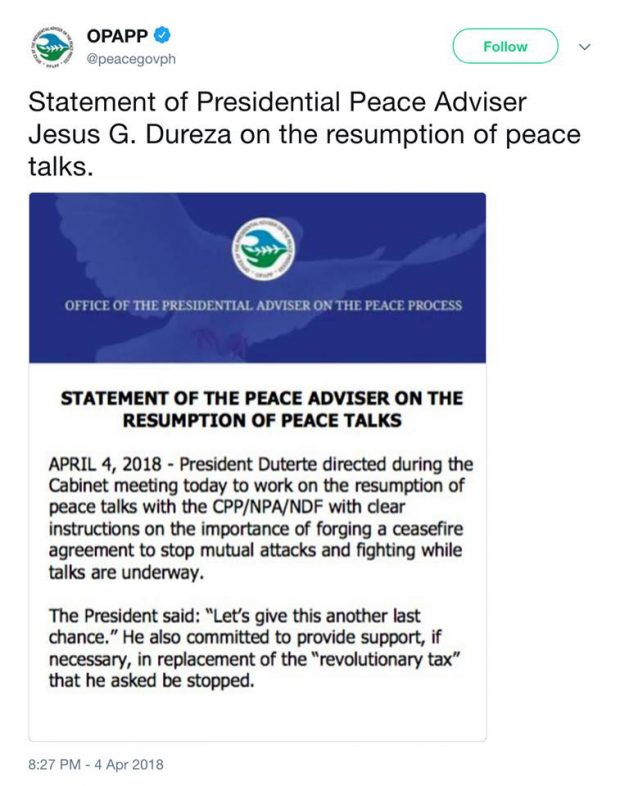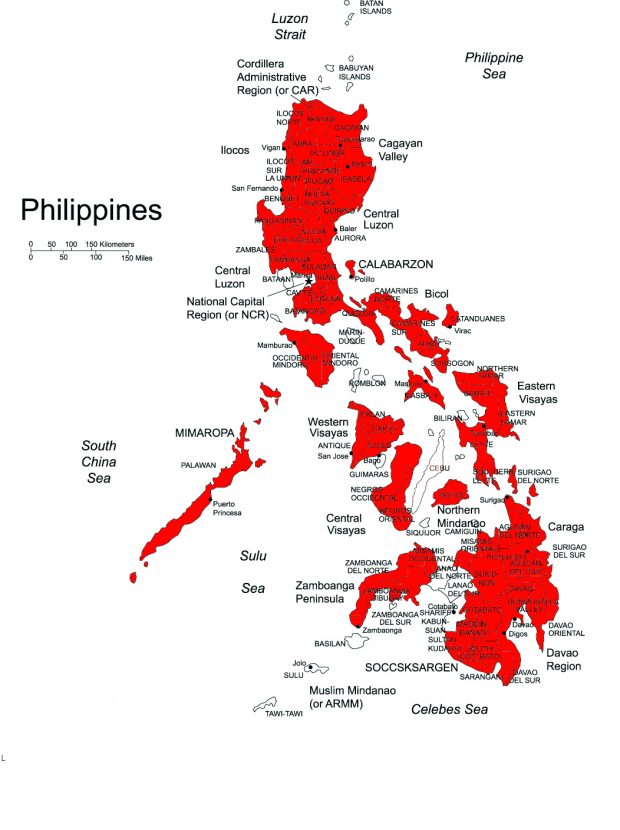AMSTERDAM, The Netherlands—The National Democratic Front of the Philippines (NDFP) Negotiating Panel is recommending to the Communist Party of the Philippines (CPP) and the NDFP Executive Committee a reconsideration of the order to intensify attacks against Government of the Republic of the Philippines (GRP) forces after Department of National Defense secretary Delfin Lorenzana’s statements against the New People’s Army (NPA).
Seeking to ease tensions on the eve of their fifth round of formal peace negotiations in this country caused by an exchange of accusations by GRP chief negotiator Silvestre Bello III and the CPP yesterday, the NDFP’s chief political consultant said both the Left and the Duterte government must unite at this time against United States of America’s Central Intelligence Agency (CIA)-supported terrorism.
“The NDFP Negotiating Panel has recommended to the National Executive Committee of the NDFP and in effect the Central Committee of the CPP to reconsider the order to the NPA to intensify tactical offensives as response to the Lorenzana statement that the NPA is a target of martial law,” Sison said.
“The terrorist act by the Maute group should not be an obstacle to the fifth round of formal talks but should be an incentive to the GRP and NDFP to meet and agree to fight groups that are terrorist because they target, terrorize and harm civilians, solely or mainly,” he added.
Sison explained the GRP side has clarified that the NPA is not a target of President Rodrigo Duterte’s martial law declaration in Mindanao last May 22 after the Maute Group group started its attack of Marawi City, Lanao del Sur.
“In fact President Duterte himself told (NDFP chief negotiator) Fidel Agcaoili in their recent meeting that the GRP and NDFP should unite against terrorist groups like the Maute group and Abu Sayyaf,” Sison said.
Sison added the NDFP are together with the GRP in opposing and fighting the ISIS-affiliated and CIA-supported groups like the Maute group and Abu Sayyaf.
“We in the NDFP condemn the attack by Maute group on Marawi City,” Sison said.
Earlier, NDFP-Mindanao condemned attack in Marawi City by the Maute Group and expressed concern and solidarity for the people of Marawi City.
Heated exchange
Yesterday, the CPP took exception to government chief negotiator Silvestre Bello III’s statements the underground party insulted Duterte and said martial law over the entire Mindanao region is an attack against the civil and political rights of the Filipino people.
“It curtails their freedom of movement and other freedoms. Martial law transfers these freedoms to the military and subjects the people to abuse. Under martial law, it is the military, these notorious abusers of human rights, who rule,” the CPP warned.
The CPP cited harassments already being conducted by government forces against civilians in Mindanao.
“In Davao City, with its overzealous martial law supporter Mayor Sarah Duterte, people in their communities are being rounded up. Close to three hundred people have already been arbitrarily arrested by the military for failing to comply with the arbitrary rules imposed by the military and the militarist-minded bureaucrats,” the CPP said.
Suara Bangsamoro- Socsksargen also reported about 30 women Lumad, Moro, pastors and church lay workers of the Ecumenical Women Forum were detained and interrogated by the 6th Marine Landing Battalion Team (MLBT) in Brgy. Domulon, Palimbang, Sultan Kudarat at about 7:30 morning of May 25.
In an alert, the group said the interrogation lasted for more than an hour and the victims’ photos were taken.
The traumatized victims were on their way to attend their Capacity Building and Ecological Seminar Workshop and community integration when waylaid by government troopers.
“Duterte’s martial law is bound to be worse than its Oplan Tokhang. With these stringent policies, Duterte is demonstrating that under his martial law, everyone is a suspect until they can prove otherwise. As every Filipino knows, especially the poor and downtrodden, proving one’s innocence to the military is often impossible,’ the CPP said.
“As Duterte’s martial law is against the people, it is imperative for the New People’s Army (NPA) to take action to oppose and fight it in order to defend the people’s rights and interests,” the group said, explaining its earlier statement ordering its armed wing to conduct military operations against state forces in response to Duterte’s martial law declaration.
Yesterday, Bello scored CPP’s directive to the NPA to intensify attacks as “totally misplaced borne out of a grossly distorted appreciation of the President’s intention.”
“We are deeply disturbed that the CPP made a false reading of the intents of President Duterte in placing Mindanao under Martial Law,” Bello said in a statement, explaining the GRP chief executive saw the need “to restore law and order, protect the lives of the citizens and preserve private and state properties.”
Bello added the CPP’s order is senseless and betrays “the absence of sincerity of the CPP in the negotiating table.
He demanded the CPP recall its directive or be accused of abetting the “criminal and terror acts of the Maute group and a gang of Moro bandits.”
Bello denied Duterte’s martial law is also after the NPA.
“The President, in no uncertain terms, categorically declared he was not after the NPA,” he said.
“Loose Lorenzana”
Bello’s statement, however, runs counter to Lorenzana’s earlier statement that the NPA is one of the targets of Duterte’s Mindanao-wide martial law order.
In a press briefing last May 23, Lorenzana said Mindanao was placed under Martial Law “because there are also problems in Zamboanga, Sulu, Tawi-tawi and also in Central Mindanao in the BIFF (Bangsamoro Freedom Fighters) area.”
“We also have problems in Region 11, the extortion activities of the New People’s Army,” Lorenzana said in Filipino.
“If it was true that martial law in Mindanao is not directed against the NPA, then Bello must inform Defense Secretary Delfin Lorenzana,” the CPP countered.
“In announcing the declaration of martial law, it was Lorenzana himself who cited the NPA as one of the GRP’s ‘problems’ why the entire Mindanao had to be put under martial law,” it added.
Sison also scored Lorenzana’s statement, saying he deplores Lorenzana’s statement that the NPA is also a target of Mindanao-wide martial law. # (Raymund B. Villanueva)


